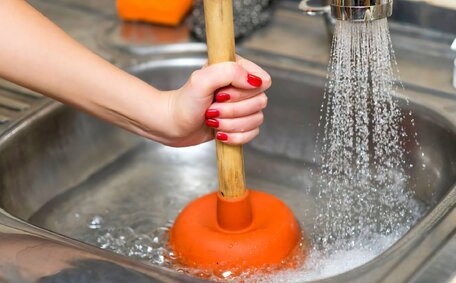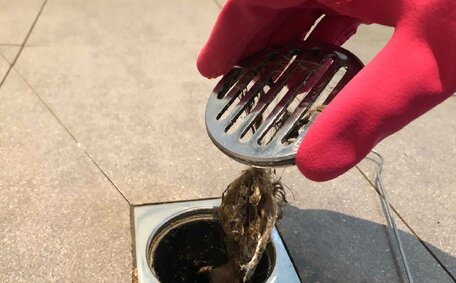What Causes a Blocked Shower Drain?
Among the most common causes of a clogged shower drain, we can identify:
- Long hair and soap accumulation can entangle, creating stubborn blockages.
- Soap scum, resulting from soap and shampoo residue, can adhere to pipes and cause blockages.
- Oils and grease from skin and hair care products.
- Dirt and dead skin - Accumulations that wash down from your body during a shower.
When dealing with hair and soap residue, it can create a tunnel laden with buildup in your shower, causing blockages. To effectively unblock a shower drain, gently pour hot water down the drain opening to help dissolve the blockage. Hair tends to act as a net that catches soap and other residues as well.
Objects like bottle caps or washcloths can unforeseeably cause clogs if accidentally flushed down your pipes.
Drains frequently used, such as your shower drains, are susceptible to shower drain clogs and might require a robust process to unclog. Discovering how unblock a drain becomes critical in bathrooms with considerable use, especially in homes with multiple occupants, leading to more hair and soap accumulation.
Quick Fixes to Try at Home
Try Hot Water
To address clogged pipes, carefully pour hot water into the drain to dislodge blockages. Hot water effectively softens soap scum, hair, and debris, helping to clear clogs. Use hot water systems with caution - ensure the water is hot but not boiling to avoid damaging PVC pipes.
Pour about four litres of hot water down the drain to help dislodge minor blockages. Repeat a few times if the water starts draining slowly at first.
You can try pouring boiling water followed by a pour cup of baking soda to address your clogged drain and let it sit for 5-10 minutes to work through the residue.
Manually Clear Visible Clogs
Inspect the drain cover and surrounding area for any visible obstructions and clear them to prevent blockages. Many were very happy to find this quick fix was helpful as it only takes a few minutes and effectively works for minor clogs close to the drain opening.
Use gloves to protect your hands.
Treating with a cup of baking soda followed by white vinegar can help dislodge deeper clogs. Straighten out the hanger first and slowly work it down the drain tunnel gently dragging along the sides feeling for snags.
Avoid scratching your pipes. And don’t push too hard as plumbing work requires measured force to avoid poking a hole through pipe joints. Be patient and give the work done sufficient time with this method.
Using a Plunger
Use a Plunger
Use a plunger to create suction and displace tough clogs in your drain. This works for clearing blockages further down the pipes beyond the drain entrance. To effectively unblock shower drains, follow these steps:
- Fill the tub with water to create a seal and enhance water flow, helping to clear standing water in the drain.
- Position the plunger directly over the drain hole for effective drain cleaning.
- Press down firmly to form a tight seal around the opening.
- Using the plunger, apply force up and down rapidly 10-15 times to loosen the clog.
- Try a few more cycles being careful not to scratch the enamel.
- Pour water down drain again to clear out any remaining debris after plunging.
Applying petroleum jelly around the plunger rim helps unblock your shower drain by getting a tighter seal. Make sure to thoroughly clean the plunger after use to prevent further clogs from any grime transfer.
Determining what to do when dealing with obstinate clogs, several cycles of plunging may be essential to clear your shower drain. This technique serves To fix blocked shower issues effectively, you might need use practices targeting those caused by an accumulation of soap and hair, rather than hard deposits or objects. Be patient and take breaks to avoid cracking drainage pipes from overzealous plunging.
Chemical Drain Cleaners
Use Chemical Drain Cleaners
In most cases, Chemical solutions from hardware stores can tackle blockage your shower drain effectively by dissolving hair, soap scum, and grease. Products often contain more than potent substances that resemble caustic compounds such as sodium hydroxide or sulfuric acid to break down blockages.
Consider hiring a professional plumber if you’re unsure about adhering to safety precautions when using corrosive commercial cleaners. Don appropriate rubber gloves and eye protection for safety. Just make sure to use only small quantities, never mix products, and rinse thoroughly with water afterwards.
After treatment, flush the drain with hot water to ensure the blockage is cleared. Repeat if needed for difficult drain blockages.
For clogged showers, carefully pour the cleaner into the drain, ensuring penetration deep into the piping for the required time. Chemical cleaners can easily be the most effective when used properly, acknowledging that water can drive these chemicals down safely, but they also carry risks like toxic fumes, burns, or pipe damage from overuse or accidents.
Therefore, be cautious and choose a cleaner with a strength suitable for the condition your shower drain can be in. It’s safer to start with natural drain solutions like baking soda and vinegar for your pipe’s health before resorting to commercial cleaners.
Using Baking Soda and Vinegar
Baking Soda and Vinegar Treatment
A homemade mixture of baking soda and vinegar works as a drain cleaner to clear shower blockages. The chemical reaction between the base (baking soda) and acid (vinegar) creates carbon dioxide gas bubbles. This fizzing action can help break and dislodge gunk coating the pipes.
This homemade remedy, less harsh than commercial cleaners, is a gentler alternative for treating blockages before resorting to stronger chemicals. However, you may need to use drain cleaning applications several times to fully clear stubborn obstructions.
- Pour 1 cup of cleaning vinegar down the drain to address and tackle any blockages.
- Let it sit for 5-10 minutes to coat the pipes.
- Follow by slowly pouring in 1 cup of white vinegar.
- The mix will rapidly foam and fizz, due to a half cup of vinegar reacting with the baking soda.
- Deploy a drain plug or position a towel over drain to contain the reaction and leave for 30 minutes to take effect.
- Flush with hot water to get rid of any loosened debris.
We highly recommend always protecting your own hands by wearing gloves when handling the ingredients. Repeat the vinegar baking soda treatment 2-3 times if your drain persists in being partially clogged. The fizzing action can break up soap scum and hair fairly effectively with patience.
You can also alternate the addition order. First pour vinegar down, followed by baking soda to initiate a rapid fizzing cascade down your pipes. Just avoid getting any fizzy splashes on your skin or in your eyes.
Unclogging Tools to Reach Deep Clogs
Use Tools to Clear Stubborn Clogs
For deeper clogs that persist beyond home treatments, specialised drain tools are crucial for unblocking shower drains:
Drain Augers/Snakes
A drain snake, also known as an auger, uses a flexible metal cable to navigate through pipes. At the end is a curved rotating tip designed to latch onto hair, debris and scrub the pipe walls. Know how to slowly spin and push the cable aiming to snag and extract clogs 8-10 feet down.
- Start with a hand twist auger for DIY novices - automatic powered versions can be dangerous if mishandled.
- Remove drain cover plate and carefully insert cable avoiding scratches.
- Twist handle gently and push slowly once resistance is felt.
- Retrieve and wipe cable to remove hair and any other debris caught.
- An LED camera snake provides visual guidance and confirms if the blockage is cleared.
Improvised Wire Hanger
Don’t force beyond hand tension or risk puncturing pipe joints.
Wiggle and scrape along gently, as this method can seem like a simple task but is remarkably effective for shower and sink drains. For simple hair obstructions closer to the drain entrance, insert the end of straightened heavy gauge wire coat hanger down the pipes.
Attempting to self-service stubborn clogs carries potential flooding risks if problems persist. At that juncture, they sent plumbing services to professionally inspect and clear your blocked drains.
Preventing Future Clogs
Prevent Future Clogs
There are several easy ways to help prevent clogged shower drains, ensuring smooth water flow and less frequent maintenance:
- Install a drain catcher to prevent hair from entering pipes and avoid clogs caused by hard water.
- Regularly clear away accumulated hair, and if needed, seek assistance from professionals.
- Each month, use a combination of baking soda and vinegar followed by hot water to keep pipes clean.
- Avoid harsh chemicals - Stick to gentle cleaning products to protect pipes from corrosion over time.
- Use a drain strainer - Fit drain baskets to collect debris from water flow without obstruction.
- Check pipes when moving in - Inspect plumbing condition to identify potential problem areas from the outset.
Proactive plumbing maintenance ensures the health of your drainage system; for advice, feel free to contact us. Short showers, minimal use of hair and body products, and collecting greywater for reuse are practical ways to reduce debris in pipes.
A slow drain is an early indicator of a potential blockage, prompting immediate action. Address this promptly before major obstructions form. Contact us for annual professional maintenance checks to assess and service pipes if DIY efforts are insufficient.
When to Call a Professional Plumber
Consult a Licenced Plumber
Should DIY attempts prove unsuccessful, engage a professional plumber to address your drain issues. Persistent clogs can often indicate more serious issues such as tree roots in the lines that can take expert mechanical clearing to resolve.
For older homes, if suspecting burst or corroded pipes, consider consulting us for potential replacements. Upgrades allow better water flow and prevent recurring blocks.
If you’re on the Gold Coast and encounter signs of drain issues, contact Strathfield Plumbing for assistance.
- Complete drain block with no water drainage
- Linked sinks/tub drains also clogged suggesting main line block
- Strange gurgling sounds from pipes when other fixtures run
- Lingering bad odours indicating a need to unclog your shower drain
- Multiple attempts at DIY methods unsuccessful
- Slow draining exceeding 30 minutes to empty
- Rust flakes, cracks or evidence of leaks that suggest it’s time to unclog your drainage system
- Frequent reoccurring clogs every few months
If faced with persistent blockages, promptly call a professional plumber. Blocked drains can quickly escalate into flooded bathrooms, unhealthy mildew and water damaged walls or ceilings if left untreated.





